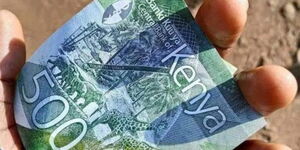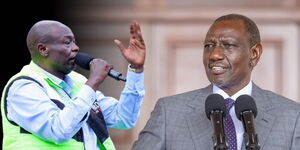African Development Bank (AfDB) chair Akinwumi Adesina on Tuesday, May 21, proposed three ways that African countries, such as Kenya, can implement to help cushion themselves from tariffs imposed by United States President Donald Trump.
Engaging the United States through flexible and constructive trade negotiations, alongside diversifying export markets to reduce dependency on any single partner, are two measures Kenya can employ.
Additionally, accelerating the African Continental Free Trade Area (AfTFA) implementation to unlock the potential $3.4 trillion (Ksh440 trillion in the current exchange rates) market can also go a long way in shielding from the ramifications of Trump’s stance.
While speaking in Abidjan, Ivory Coast, Adesina warned that these measures could trigger significant economic disruptions across Africa, affecting numerous nations and accelerating a strategic shift in global partnerships.
Currently, 47 of Africa’s 54 countries, Kenya included, will be impacted directly by the new U.S. trade policies, with potential declines in export revenues and foreign exchange reserves.
“When those currencies weaken, two things will happen: first, you will find that most of these countries are import-dependent. So, you're going to find that high inflation becomes a problem,” said Adesina.
“And secondly, you find that the cost of actually servicing a lot of their debt, which is foreign currency debt but in local currencies, is going to get worse.”
Almost all African countries have been hit by higher tariffs announced by the Trump administration, with at least 22 nations facing up to a whopping 50 percent for almost all their products.
Last month, Trump imposed a reciprocal tariff on trade with Kenya. Under the new tariffs signed by Trump, Kenya's Ksh109.7 billion (784 million USD) trade with the US was set to suffer a blow after a 10 per cent baseline tariff on all of Kenya's exports.
Despite Trump later announcing a 90-day pause on the tariffs, it was set to affect Kenyan exports, particularly in key sectors such as textiles, tea, and coffee, which have been exempt from tariffs under the African Growth and Opportunity Act (AGOA).
The impacts of these higher tariffs were further exacerbated by significant cuts to USAID programs, which have already begun affecting access to essential medical supplies and humanitarian services in many countries, raising serious concerns about the future trajectory of US-Africa relations.
Despite the challenges, Adesina emphasized that Africa cannot afford a trade confrontation with the United States, noting that the continent accounts for only 1.2 per cent (approximately $34 billion(Ksh4.4 trillion in the current exchange rates) of America’s global trade, with a trade surplus of just $7.2 billion (Ksh 932 billion).
He stressed the need to expand Africa’s domestic market and boost domestic savings to develop consumption as a bigger share of its GDP, leveraging its massive population growth. More importantly, he advised the continent to take advantage of the increasing external interest in its natural resources, such as cobalt and lithium, to negotiate a better trade and investment deal.
In the midst of all this, Adesina still called for strategic global engagement, even as calls for a shift of alignment to China.
Addressing speculation that Africa may shift more decisively toward China in response to the higher U.S. tariffs, Adesina dismissed any notion of binary alignment.
“The US is a key ally of Africa—and so is China. Africa is building bridges, not isolating itself,” Adesana stated.
Consequently, he stressed that Africa seeks balanced, transparent, and mutually beneficial partnerships with all major global players, including the US, China, the European Union, and the Gulf states.












